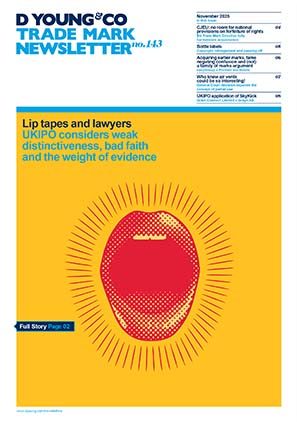The extreme approach: use restraint when assessing a hearing officer’s decision
The applicant, Extreme E, sought to register the mark shown below in the UK, for services in class 41, including the organisation of sporting and cultural events, motor vehicle races, and award ceremonies. This application faced opposition from Extreme Networks, an event and experience organiser, which holds a UK trade mark covering the class 41 service of booking seats for shows.

Background
At first instance a likelihood of confusion between the two marks was found. Notably, the United Kingdom Intellectual Property Office (UKIPO) hearing officer concluded that organising sporting and cultural events shared a medium degree of similarity with booking seats, due to their complementary nature and overlapping audience. Additional similarities in the services’ nature, user base, method of use, and purpose supported this finding.
Extreme E appealed, arguing that ticket sales were incidental to event organisation and that many sporting events lack bookable seating. The High Court agreed with Extreme E and overturned the hearing officer’s decision.
Having appealed to the High Court, rather than the UKIPO appointed person, it was open to Extreme Networks to seek leave to appeal further, to the Court of Appeal, which reinstated the original assessment of similarity.
The correct approach
Lord Justice Arnold, in the Court of Appeal, began by clarifying the proper approach for determining whether a hearing officer’s decision should be overturned. He emphasised that assessing similarity requires a multi-factorial evaluation, considering factors such as those listed above. Consequently, an appellate court may only intervene if there is an error in law, logic, or consistency. Simply reaching a different conclusion based on the same facts is insufficient.
This approach demands considerable judicial restraint and caution, embodying the principle of mutatis mutandis, meaning that it is not appropriate to hastily conclude there has been an error in law or logic, even if every detail of the decision is not explained. Given that hearing officers are specialists in their fields, it is reasonable to presume that they will arrive at the correct conclusion.
This perspective profoundly shapes the Court of Appeal’s assessment of the case, which is best understood through sporting and non-sporting lenses.
Non-sporting events
As previously noted, in the High Court, Extreme E contended that the booking of seats was merely incidental to the organisation of a show. However, the Court of Appeal deemed this argument irrelevant in assessing similarity, emphasising that it was a test of identity. Consequently, the hearing officer made no error in law or logic and was justified in concluding that, given the complementary nature of the services (one being essential for the use of the other) consumers could reasonably perceive the same entity as responsible for both. As a result, the similarity finding was upheld.
Sporting events
Extreme E also argued that sporting events should not be classified as “shows” and that many lack seating or bookable seating.
Initially, Lord Justice Arnold highlighted Justice Holgate’s definition (in the High Court decision) of a show as “a display, exhibition, spectacle, or form of entertainment”. Despite this definition being relatively broad, the High Court concluded that it did not include sporting events. In contrast, the Court of Appeal reasoned that it could not see why sporting events could not fit within this definition to conclude that sporting events are shows.
On the second point, the Court of Appeal acknowledged that while some sporting events may lack bookable seating, or seating entirely, the majority of sporting events have them. Consequently, the Court of Appeal found the hearing officer had again made no error in law or principle that warranted intervention, therefore the initial decision was reinstated.
In short
At first glance it appears that this case simply confirms that the organisation of cultural and sporting events are likely to be considered as similar to the booking of seats for shows.
However, this decision may also serve as a helpful guide in relation to the approach courts should be taking when deciding whether to intervene in a hearing officer’s decision. The mutatis mutandis approach emphasised throughout the Court of Appeal judgment reaffirms the attitude of judicial restraint exercised in these cases, setting a relatively high bar for intervention of a clear logical or legal flaw.
Case details at a glance
Jurisdiction: England & Wales
Decision level: Court of Appeal
Parties: Extreme Networks Limited v Extreme E Limited
Citation: [2024] EWCA Civ 1386
Date: 06 November 2024
Decision: dycip.com/ewca-2024-1386

